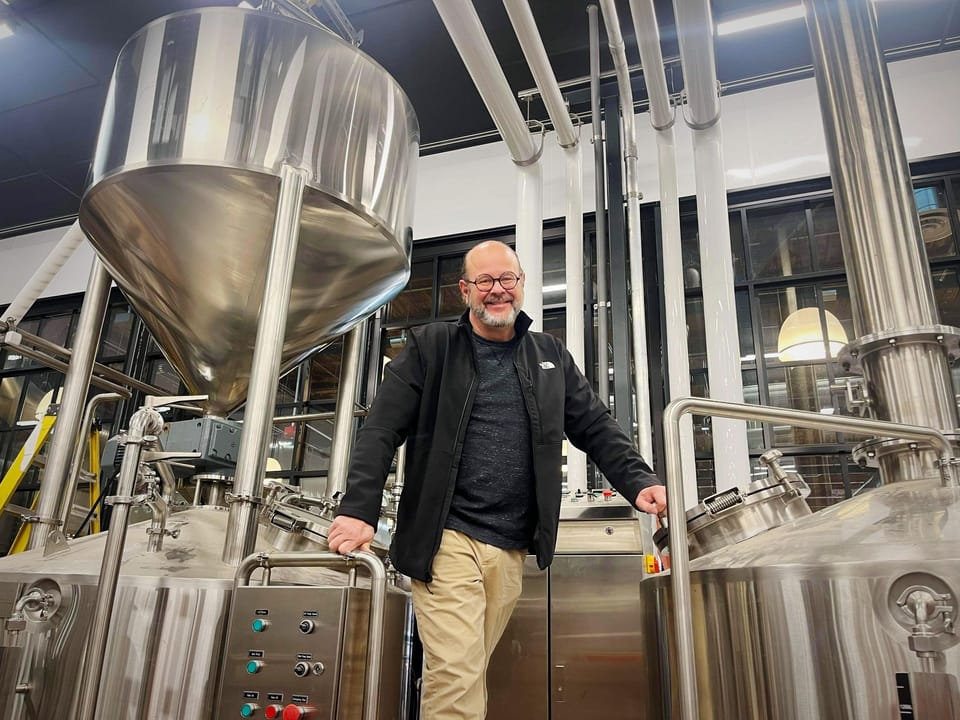More than a brewery: What to know about Chapman’s new taproom at Electric Works

If you know Scott Fergusson as the Founder of Chapman’s Brewing Co., you might not realize he has a background in software development. In fact, it was through founding the digital recruitment company Investigo in 2001 — and selling it to Broadridge in 2008 — that he got into craft beer in the first place.
“I had the opportunity to visit clients all over the U.S., and everywhere I went seemed to have a thriving craft beer scene,” Fergusson says.
For more than a decade now, he’s been working to bring more craft beer culture to Northeast Indiana, first by opening Chapman’s as a wholesale operation in Angola in 2012. But over the years, something Fergusson has discovered is that – much like his own entrepreneurial spirit – craft beer culture is socially driven.
This led him to open Chapman’s first taproom in Downtown Columbia City, which seats about 150 people. Its success – and the desire to invest in Fort Wayne’s future – inspired him to open the city’s largest, $4 million brewery as the anchor food tenant at Electric Works this spring.
“It’s really come down to my desire to see people having a great time, meeting up with friends and solving the world’s problems together,” Fergusson says. “Beer has helped people do that for about 5,000 years now.”
Chapman’s new location opens March 8, and when you visit, it’s not your average brewery. Within it, Fergusson and his team are working to solve a few problems of their own and returning to his software development roots.
Teaming up with local art aficionado Cornelia Schulz, Fergusson is co-launching a new venture called allwalls.art at Chapman’s – an ecommerce platform seeking to simplify the process for buying and selling local artwork right off the walls at venues using QR codes.
We sit down with him to learn more about this project, his new brewery and other challenges he’s taking on at Electric Works this spring.
Tell us more about your new location for Chapman’s. Why did you choose Electric Works?
SF: Electric Works is representative of more than 100 years of innovation in heart of Fort Wayne, and when you walk into the new brewery, you’ll be able to see our product being made and drink it right out of the tap, so it feels very true to the spirit of the campus. It contributes to everything that’s already happening on campus, too, from learning opportunities with Amp Lab students, to providing space for business meetings and offering refreshments during summer farmers markets.
But deeper than that, Electric Works is symbolic of Fort Wayne making the most of this massive campus in the heart of the city that nobody really knew what to do with for a long time. It’s symbolic of our community rising to the challenge and working together to solve a problem, which is true to our ethos as a company, as well. Instead of asking whether something cool like this could happen in Fort Wayne, we frequently find ourselves asking: Why not Fort Wayne?
Chapman’s new location is unique in many ways. Tell us more about what sets it apart, as a brewery?
SF: As far as size, it will be the largest brewery in the city with 15,000+ square feet, up to 260 seats, and it will have 24 beers on tap with a new beer every week, indefinitely. Another thing that makes us unique as a craft brewer is that we don’t see our customers as guinea pigs. Instead, we’re leaning heavily on traditional brewing styles that have stood the test of time around the world, and we’ll bring more of those styles to Fort Wayne, using ingredients we have locally, like corn and paw paws, to honor where we live.
We’re also attuned to the local market, and we know there’s a strong German undertone to Northeast Indiana. So while craft breweries typically offer IPAs, we know that many people here prefer beers with lower alcohol content and more full-bodied, less bitter flavors that are approachable and easy to drink. We’ll also have some non-alcoholic beer options on tap for those who enjoy the taste, but don’t want the alcohol content.
What are some of your most popular menu items so far? Any recommendations?
SF: For food, we focus on good burgers and smoked entrees that complement our beer. At our new location, we’re combining that with creative and unbelievably tasty vegetarian options, too. We hosted several soft openings to refine our dishes and come up with a menu that’s high quality and sensitive to what the community wants and needs.
As for beer recommendations, I happen to love our Southern English Brown Ale and our Harvester Lager. Both are super drinkable and go with just about everything on the menu. They’re not high in alcohol content either, so you really can sit and drink them all day — which is what we hope our customers do. Our goal with this new, large location is to provide a place for people to hang out all day if they’d like.
Our menu also provides pairing recommendations for our beer. I would pair our Harvester Lager with our bratwurst and pair our Southern English Brown Ale with our brisket or burger. If you need help deciding, our staff is trained to walk you through the menu, and we’ll have a fun game you can play to guide you through the beer we have on tap and what you might like based on your preferences.
Are there any new items you’re excited to introduce?
SF: We’re working on our own grind for bratwurst and a brisket burger. I’m also excited about our smoked items, which are adjacent to BBQ. We have some great flatbreads we’re experimenting with, too.
It seems like everyone in the service industry is struggling with staffing since the pandemic. How do you plan to address this challenge?
SF: We want to be very intentional about managing the burnout of our staff, so we’re giving our managers fewer hours and more authority to manage. The problem we’re trying to solve is: Restaurant managers typically end up working 80 hours a week and are often dealing with an ever-changing turnover of their staff or filling in for other employees when they get sick or don’t show up. So to help manage that, our front and back of house will have management teams who work together to schedule in a way that no one is booked more than 30-35 hours per week. Of course, with no-shows and sick days, we assume employees will end up with closer to 40-50 hours per week. But the goal is to get ahead of the challenge and provide teams with more power and flexibility.
Tell us more about how the brewery will be a community hub.
We’re excited to host local meetups and events. We want to be a comfortable, neighborhood gathering place with free wifi, and we have all kinds of groups that have already reached out to us to reserve tables for their quarterly meetings or game nights. In addition to our general seating area, we have a private dining area for 36 guests, and we’re can host up to 400 guests total, if you book our entire dining room and open it up into the Forum’s space next door. We’ll offer catering and special menus for events, like weddings at other locations on campus, too. This fall, we’re going to have a huge Oktoberfest celebration, so watch for announcements about that!
Tell us more about allwalls.art and how it’s working to boost local art sales at Chapman’s — and hopefully more venues across the city.
What we’re trying to do with allwalls.art is reduce the friction to buying local art at restaurants, coffee shops and other venues. I believe 90 percent of all local art sales are emotional, so I’ve built an ecommerce platform that’s QR-driven where, when you see something on the wall that you like, there’s a QR code for you to buy it on the spot and take it home — right then and there — versus contacting the artist and waiting to hear back from them, etc., which can be cumbersome and time-consuming and may even prevent people from buying art.
My Co-Founder Cornelia and I are launching allwalls.art at Chapman’s, where we already have local art on the walls (currently a local photography exhibit) ready for you to check out and purchase on the spot. We’re working with local galleries and art brokers, too, so we’re not trying to “break” the current system for buying art; we just want to be the ecommerce platform that helps artists and brokers get pieces sold and, hopefully, provide them with data on what types of artwork sells best. Everybody’s doing data collection right now in ecommerce, but it hasn’t been done much in art sales yet — even in bigger cities — so we’re excited about what allwalls.art can do.
When pieces are sold through our platform, we’ll take about a 5% portion of the sales for our operations (plus a small fee for the venue). But we believe the data and service we’re providing artists (or brokers) will make it worth it. Anyone interested in learning more should check out our website, and reach out.
How do you see art as a part of your mission at Chapman’s?
Making beer is a creative process, much like making art, and ultimately, there’s a premise you have to accept or not, which is: Fort Wayne would be a better city if it had more art and culture. We believe that art is good for the city’s health and future, and Chapman’s wants to be good for the city, too.
Any last-minute details or pro tips you want to share about the upcoming Grand Opening?
SF: Our Grand Opening will be Friday-Saturday, March 8-9, and we’re starting with our regular hours, which will be: 11 a.m. to 1 a.m. Fridays-Saturdays and then 11-2 p.m. Sundays, closed Mondays, and 11 a.m.-10 p.m. Tuesdays-Thursdays.
As for pro tips, sign up for our newsletter, so you know when our next beers are coming out and what they are. When we make a batch of beer here, it’s gone when it’s gone, and we’d hate for you to miss it. Our Roulette Club loyalty discount program is a good deal for beer drinkers, too!
